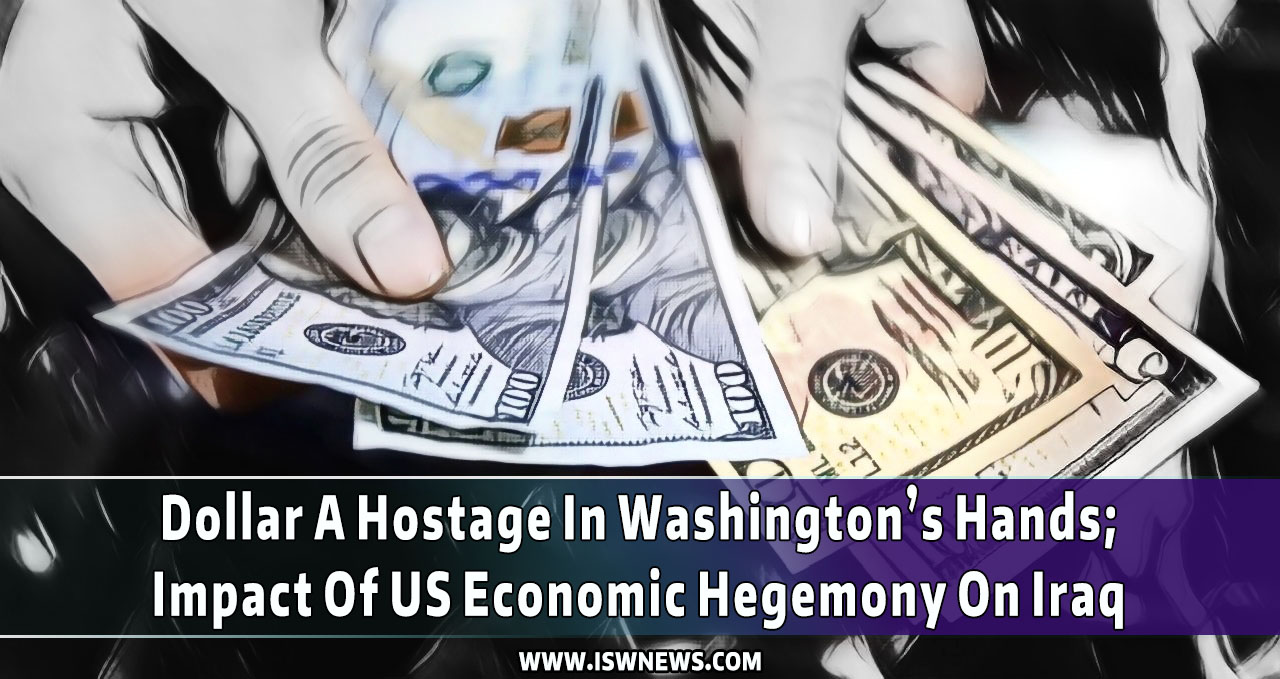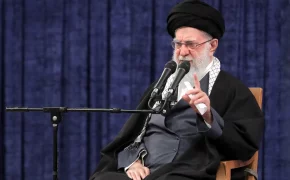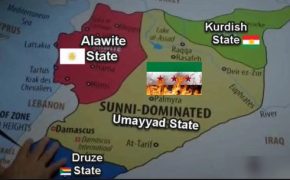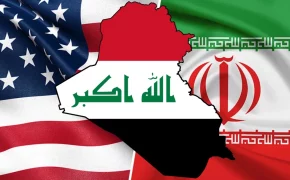Dollar A Hostage In Washington’s Hands; Impact Of US Economic Hegemony On Iraq


Iraq as an Arab state, which was somehow completely capable of getting rid of the ISIS terrorist group’s threat, nowadays is engaged in economic chaos caused by the United States’ pressures. Iraq has been tasked with transferring all of its oil sale revenues to a bank account in the US! Washington is currently decreasing the value of Iraq’s national currency (Iraqi Dinar) and avoiding payments as a tool in order to utilize Baghdad’s dollars against Iraq itself. The United States imposed several strict sanctions on the Arab nation, including embargo on Iraqi banks and blocking their money as well as rationing of dollars belonging to Iraq, which are kept in the US banks under the excuse of fighting economic corruption in the oil-rich country.
The ongoing fluctuations in the exchange rate of the US dollar against the Iraqi dinar cause difficulties for the political and social circumstances in the Arab state. Iraq is a West Asian country, which was capable of defeating the ISIS terrorist group as well as foreign-backed color revolutions; however, today the Islamic nation is experiencing social turbulence caused by the US-imposed economic sanctions. The US has inflicted harsh measures on the Iraqi banks under the excuse of hampering the smuggling of foreign currencies as well as money laundering. To this end, the United States Treasury Department has imposed rationing on Iraqis’ oil revenues, which are frozen in the US banks, which created a situation that ended up in the dropping of the Iraqi national currency from 1,460 dinars (the official rate) to 1,640 dinars at once. Of course, newly appointed Governor of Central Bank of Iraq Muhsen al-Allaq tries to manage the current crisis in a calculated manner and he relentlessly reminds the Iraqi people of the surge in the Central Bank’s dollar reserves, which are now said to reach over 100 billion dollars, as if the increase of the reserves is part of his own achievement!
After Baghdad passed the Anti-money Laundering and Counter-terrorism Financing in 2018, the Financial Action Task Force (FATF) excluded the Arab country from the particular monitoring process also known as the international standard for the fight against money laundering and the financing of terrorism. Despite the fact that Iraq is not a member state of the FATF, the Iraqi government has carried out mechanisms to create an electronic platform linked to the international Society for Worldwide Interbank Financial Telecommunication (SWIFT) system, which is a Belgian cooperative society providing services related to the execution of financial transactions and payments between banks worldwide, in order to sell dollars. Some experts believe that the platform will be a long-term alternative and a legal window for dealing foreign currencies and it is more or less out of the control of the government in Baghdad.
The recent crisis in Iraq kicked off following the imposition of sanctions by the US Treasury Department on three Iraqi banks belonging to an Iraqi tradesman called Ali Muhammad Ghulam Al-Ansari as well as some 16 other banks. The unexpected move caused a decline of around 40% in the sale of dollars by the Central Bank of Iraq, leading to a contraction in supply and a surge in demand for the dollars in the country, which resulted in an increase in the price of the dollar to over 1,550 Iraqi dinars.
A high-ranking Iraqi official revealed that the Central Bank of Iraq and the US Treasury Department have held a series of meetings in the last quarter of 2022 in the Jordanian capital Amman to pave the way for further coordination between the Iraqi and American officials. One of the members of the finance commission of Iraq’s parliament elaborated that the US Treasury Department followed a special program to provide dollars to Baghdad regularly, which was once in every three months, when the Americans sent 2.5 billion dollars to Iraq by the use of five aircraft.
Since 2018, the American financial authorities have initiated to provide the Iraqis with dollars, which have traceable serial numbers. In the mentioned meetings Amman, the US Treasury Department informed the Iraqi authorities that sums of the traceable dollars were detected in a number of states in the West Asia region. Therefore, Washington decided to decrease the amount of the dollar transfer to nearly half of the previous sum. It is notable that the traceable dollars, which have been transferred to the Arab country comprise the Iraqis’ assets, which have been blocked in the United States’ banks.
A source close to the governor of the Central Bank of Iraq has acknowledged that the moves by the US are aimed at hindering the trafficking of dollars to regional countries such as Iran, Syria and Lebanon; so, the Central Bank of Iraq has in words ordered the Iraqi commercial banks to stop selling travelers from those three countries. The source has also mentioned that in accordance with the instructions of the United States, the transfer of dollars from Iraq to Lebanon is forbidden, even if tourists intend to transfer dollar to the neighboring country. It is worth mentioning that the Central Bank of Iraq has ordered the Iraqi banks to sell up to 5,000 dollars to travelers if and only if those who demand dollars accept to provide visas and plane tickets to prove their country of destination.
Given the fact that the United States dominates the international monetary system, Washington possesses the capability to control all the assets of the Central Bank of Iraq by resorting to threats or sanctions; even though the assets are not deposited solely in the US banks. It is interesting that the Iraqi people’s oil revenues, which amounted to more than 90 billion dollars in 2022 because of the hike in oil prices in international markets, should remain in an account in the United States, while the move is against any economic, financial and even accounting codes! The assets belong to the Iraqi government and should be supervised by the Arab state’s ministry of finance; so, the Central Bank of Iraq is not in charge of decision-making on the assets. The move by the US Treasury Department gives Washington more authority to decide upon the turnover of currency in the Arab country.
Today’s circumstances of Iraq obviously indicates that the dependence on the dollar system is detrimental for the monetary and economic policies of a state; in particular a country, which relies profoundly upon oil export revenues and its wealth suffers from a so-called single-product economy. It seems that the diversification of the fields of trade as well as accepting alternative currencies for a country like Iraq, which has a long history of political instability and economic woes, would be a more reasonable method than ever.




Comment